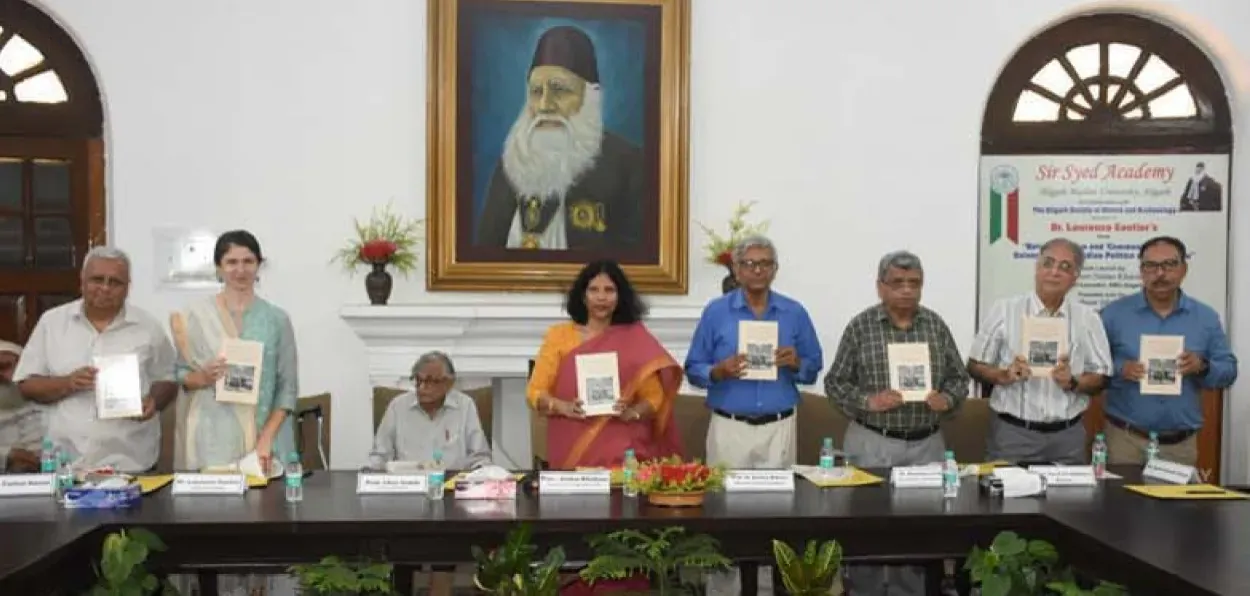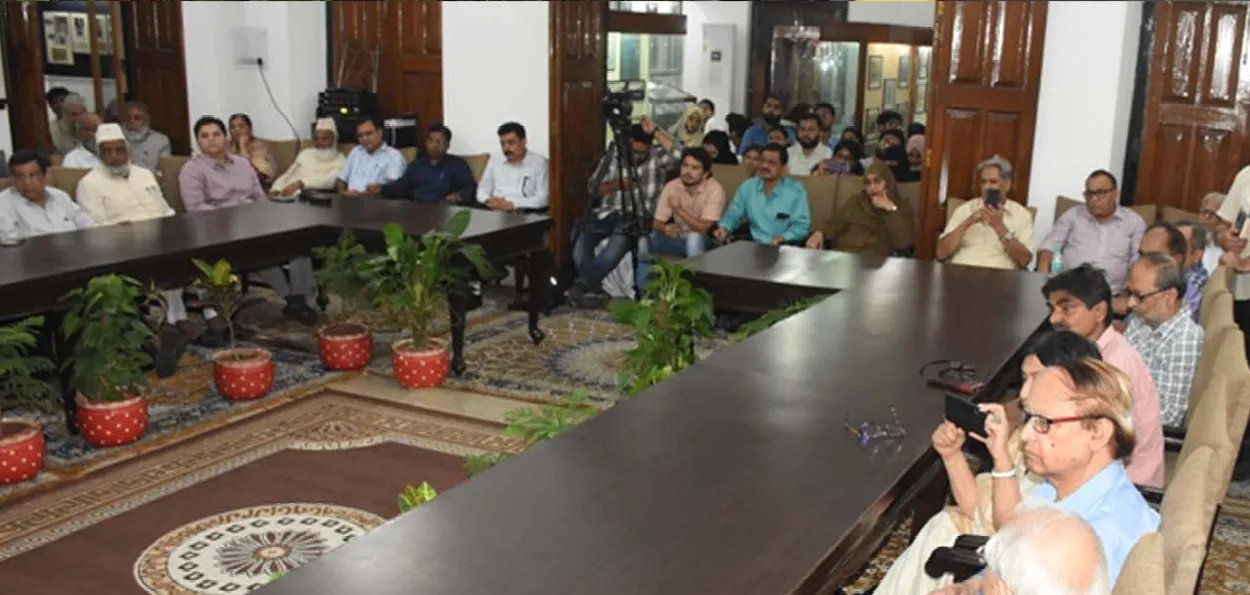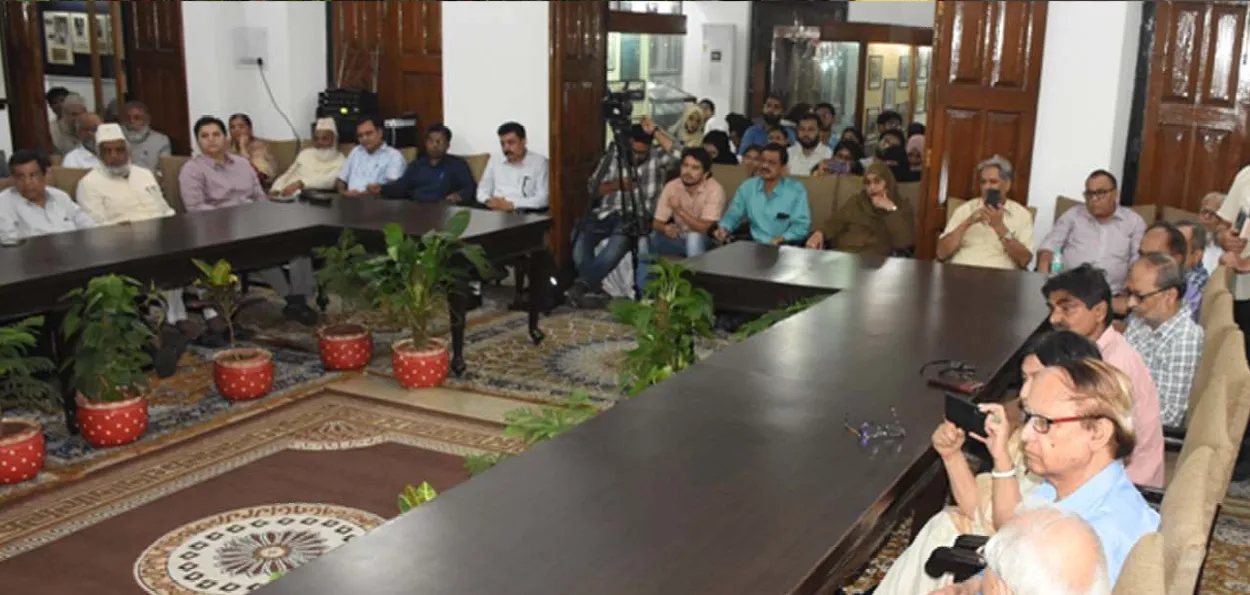
Aligarh
At the time of partition, Aligarh Muslim University was guarded by the soldiers of Kumaon Regiment which was sent by Home Minister Sardar Patel. Back then, the university was in a deep financial crisis; the authorities were under pressure. Under the ambit of the University Act of 1951, the then government took up the responsibility of setting things right. Maulana Azad, who became the first Education Minister of Free India, visited the campus and assured to protect the university's interests.
These historic facts were narrated by historian Professor Irfan Habib, Professor Emeritus, and of Center of Advanced Study, Department of History, AMU.
He was delivering his presidential address at a talk organized by Sir Syed Academy and Aligarh Society of History and Archeology on the recent work of eminent scholar Dr. Lawrence Gautier, "Between Nation and 'Community': Muslim Universities and Indian Politics after Partition". The book delves into issues of community, nationalism, secularism, the role of universities in politics, Muslim identity, and the downsides and evolution of Muslim universities.
Describing the events of the partition of India, Habib said that all the credit goes to Pandit Jawaharlal Nehru, Sardar Patel, and Maulana Azad, and then the leadership for ensuring that not a single incident of communal conflict was reported from Aligarh during 1947-48.
Professor Habib said, "I passed high school in 1947. At that time some teachers, staff members, and students were leaving the AMU, yet classes continued with restrictions and full attendance. If one teacher left, another would take the class the next day, which I still appreciate. Despite all the troubles and commotions, teaching continued at campus and there was no exception in attendance."
 Scene from the Book release function
Scene from the Book release function
He pointed out that nowadays classes are closed on the slightest pretext, whereas it was a sacrosanct duty of the teacher and students back then. He said the classes were uninterrupted during the tumultuous period of 1947-1949.
Speaking on the occasion, AMU Vice Chancellor Professor Naima Khatoon said Address the function, Prof Naima Khatoon, Vice Chancellor, AMU said “Though several books, monographs and articles focusing on accomplishments and educational transformations set in motion by AMU and Jamia have been published, a rigorous attempt to explore the complex relationship between two universities fully funded by the central government and Indian politics after partition still eludes us. Larence Gautier tried to supplement what had been left out. She insightfully spells out the role of AMU and Jamia as a central platform for negotiating between nation and community”.
Prof. Khatoon also mentioned that Dr. Gautier's writing helps in understanding the role of AMU and Jamia in advancing the quest for Muslim identity and the process of nation-building.
She said scholar David Lievel had praised AMU and Jamia for upholding pluralism as the essence of democracy. Muslims, despite their extreme educational, economic, and social backwardness, are proud and active citizens of India, and simultaneously carry on the historical and ancient legacy of Islam.
Author Dr. Laurence Gautier discussed the contents of the book and refuted the suggestion that the book is a comparison between Jamia and AMU.
She said that her book can be read in different ways. "I believe that the production of knowledge cannot be separated from politics. He said that this work also brings out how both AMU and Jamia as institutions played their role in nation-building."
Prof. Syed Ali Nadeem Razavi however said Dr Gautioer's book shows her bias towards Jamia Millia Islamia. He also disagreed with the perception from the book that Jamia is progressive while AMU is a regressive institution. His yet another point of disagreement with the book was that when AMU teachers started their affiliation with the Jamia, the latter turned reactionary.
 Guests at the Book release function at AMU
Guests at the Book release function at AMU
On the other hand, Professor Farhat Hasan of Delhi University disagreed with the view that the book is about Jamia and Aligarh. He said the book should be seen from an academic point of view.
“The competition and comparison between Aligarh and Jamia over the book's contents is unnecessary. It is purely a scholarly endeavor based on empirical research and primary sources", he said.
He praised the empirical approach adopted in the book, as well as the conclusions drawn from the use of oral traditions and primary sources. He however said he doesn't agree with the view that India's first Prime Minister Jawaharlal Nehru pursued secularism and nationalism, as he concluded from the book.
ALSO READ: An Indian Muslim student leader’s open letter to Kashmiris
Prof. Shafi Qadwai, Director, of Sir Syed Academy said that the book highlights important issues and events of history and presents these in a manner that brings out the downsides of the institutions and the role of these institutions in the country's development.
